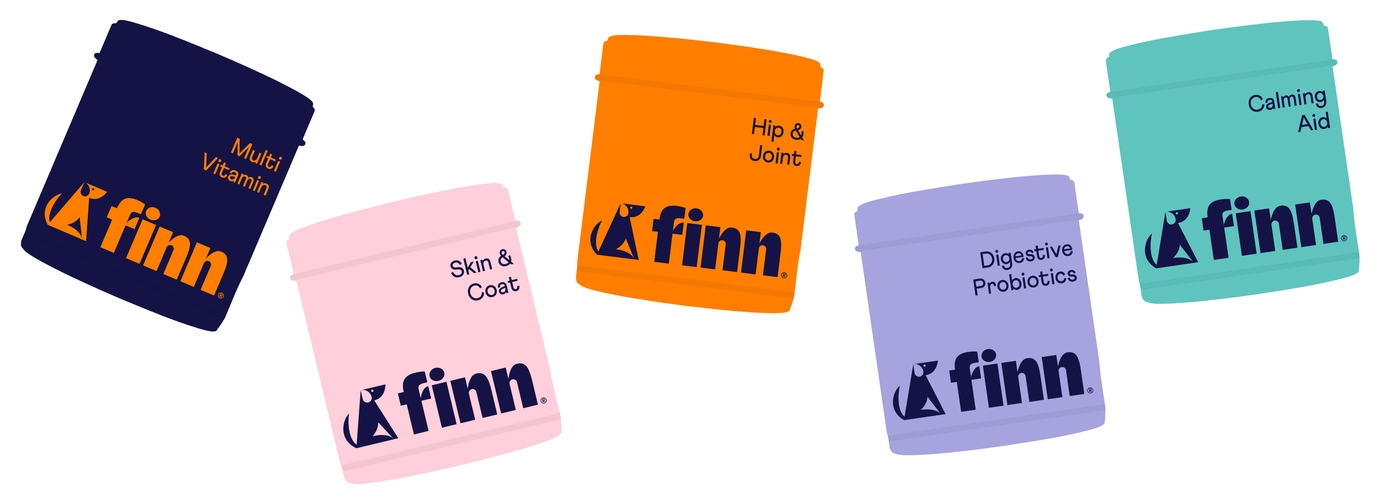
Dog Supplements: What Are They and Which To Use for Your Dog
When shopping for supplements, look for natural supplements that have been clinically tested and are recommended by veterinarians. Let’s learn more.
As pet owners, we want our dogs to be as healthy as possible.
Dietary supplements can be beneficial to your dog’s diet because they often contain essential vitamins and minerals, and offer additional ingredients like probiotics to help support your dog’s digestive health or antioxidants to help support immune health.
While many essential vitamins and minerals are found in dog kibble, supplements can give your pup some extra nutritional benefits. A supplement may be necessary for dogs that have nutritional deficiencies or need extra support for specific issues (e.g. mobility and joint issues, digestive problems, or skin issues.)
Let’s look further into what defines a dog supplement and how it can support your dog's nutritional needs.
What Are Dog Supplements?
Dog supplements contain vitamins, minerals, herbs, amino acids, probiotics, enzymes, and much more. They can be a great addition to your dog’s diet for many reasons — they can be a huge boost to your pup’s nutrition, they can support specific areas of health like metabolism or energy, and they often support your pup’s health as a whole to some degree.
Can My Dog Have Supplements Made For Humans?
Absolutely not. Sure, the supplements may appear to contain similar ingredients, but you should never give your dog vitamin and mineral supplements that are not specially formulated for them.
Human supplements may be toxic to dogs, as some of them contain xylitol (a type of natural sweetener). This is a good instance of “natural” not always equating to “safe.” When consumed by a dog, this type of sweetener is confused for real sugar, which causes the pancreas to release a ton of insulin. Because of the rapid release, hypoglycemia can take effect and lead to life-threatening health issues.
What Kind of Nutrients Does My Pup Need?
Does your dog really need a supplement? You’ll need to identify if your dog is on a complete and balanced diet and if there are any functional areas (lie hip and joint problems) that may need a little extra support.
Whether you have a puppy, an adult dog, a small or large breed dog — the nutritional needs will slightly vary. Research your dog’s breed and nutritional requirements and consult your vet before introducing supplements into their diet.
A balanced diet should contain a mix of meat (protein), vegetables, grains, and fruits. Refer to your dog’s food label for the ingredient list and percentage of proteins, fats, and carbs, as well as what vitamins and minerals are included.
Fat Soluble Vitamins
Everyone knows that vitamins are important, but do you know the benefits of each type? Some are water-soluble, others are fat-soluble.
Fat-soluble vitamins can be stored in the body’s fatty tissue and that of the liver. These include Vitamin A, Vitamin D3 (or Cholecalciferol), Vitamin E, and Vitamin K.
Vitamin A is present in carotenes. Commonly found in plants, carotenes are essential for:
- Healthy eyesight
- Bone and teeth formations
- Red and white blood cell production
- Body tissue growth and repair
Having a vitamin A deficiency increases the risk of blindness, infections, fatigue, and dental concerns.
Referred to as the sunshine vitamin, Vitamin D is important for adequate growth and development, specific to muscles and bones.
Vitamin E is also known as d-alpha-tocopherol. It protects the body’s red blood cells and vitamin A from the damage of oxidation.
Vitamin K contains coagulation proteins. Coagulation proteins are produced naturally by the body’s gut bacteria. Blood won’t clot without these proteins, making just a minor scratch or open-cut a huge concern. Dogs need Vitamin K to recover from injuries.
Water-Soluble Vitamins
Water-soluble vitamins can be transported and absorbed through water or blood in the body.
They include B-Complex vitamins like Biotin, Choline, and Vitamin C.
The B-Complex family of Vitamin B family extends to include the following:
- Vitamin B2, or Riboflavin
- Vitamin B6
- Vitamin B12
- Folic Acid
- Thiamine
- Pantothenic
Should You Give a Supplement to Your Dog?
Your dog's diet is critical when it comes to their overall health.
Dogs that are fed homemade diets may benefit from supplements. Homemade meals are an excellent choice for your dog as they provide them with whole foods. However, homemade meals could lack essential vitamins and minerals.
If you have a puppy that is constantly growing, a supplement may be helpful as they transition into adulthood.
Elderly dogs may show signs of aging. Their fur may begin to gray, they gain weight, or they may show signs of hip dysplasia. A few factors that we cannot pick up on without a diagnosis from a vet include metabolism or decreased immunity because of illness or old age.
Choosing the Best Supplement
It can be overwhelming when browsing supplements at any retailer or store — there are so many types to choose from and various brands!
Here are some tips for shopping the shelves:
Select a supplement from a trusted brand. Brands that have conducted clinical trials or have earned the National Animal Supplement Council (NASC) certification can be considered reputable. Any brand recommended by your veterinarian is also a good bet.
- Read the labels. Make sure you are familiar with the ingredients and that they match what you are looking for.
- Are there lot of numbers and expiration dates on your products? Great! This is a sign that the company has quality control checks.
Let’s break down the most popular supplement options that you can choose from.
Hip and Joint Support
Glucosamine is a natural, valuable ingredient to your dog’s diet. It’s made in a lab from the shells of shellfish.
What does it do? Glucosamine is well-known for its ability to combat joint discomfort. Joint issues are common in dogs, especially as they age. Over time, the cartilage between the bones begins to wear down and thin out, causing the bones to rub against each other.
Glucosamine supplements may help support the body’s natural repair process of damaged cartilage.
It can be administered on its own or partnered with other ingredients, including chondroitin, green-lipped mussel extract, and more. Chondroitin is another natural building block of cartilage that can support healthy joint function.
There are some side effects associated with glucosamine. Look for symptoms like allergic reactions, fatigue, insomnia, and an increase in thirst and urination.
Use glucosamine supplements to help support your dog’s mobility and energy while relieving feelings of joint discomfort. Be sure to follow the recommended dosage based on your dog’s weight.
Shiny Coat and Healthy Skin From Fish Oil
Fish oil is filled with healthy omega-3s. Fatty acids like eicosapentaenoic acid (EPA) and docosahexaenoic acid (DHA) can keep your pup’s coat shiny and support healthy skin. These essential fatty acids should be derived from coldwater fish such as salmon.
Fish oil may help with the following:
- Soothing tension throughout the body. This comes in handy for dogs suffering from joint problems.
- Keeping fur coat quality spectacular, including the way it shines.
- Supporting the body’s natural defenses against skin allergies or skin problems.
- Supporting heart health and cardiovascular health.
- Supporting healthy cognitive function.
There are three types of omega oils on the market:
- Natural triglyceride oil (fish oil) is the easiest to absorb and most bioavailable because it comes from natural fish sources. Finn uses Wild-Caught Alaskan Salmon Oil in our Skin & Coat supplement.
- Ethyl oil contains high levels of EPA and DHA and is considered semi-natural. It is concentrated and distilled to remove impurities.
- Synthetic triglyceride oil absorbs the least of the three types of oil and is synthetically made.
How Antioxidants Help
Don’t you wish that your dog could outlive you? While that may be impossible, antioxidants can help keep your pup’s health tip-top! Antioxidants offer immune support and protection from environmental toxins.
Fruits and vegetables are rich in antioxidants, but most commercial dog foods only contain minimal amounts leaving lots of room for deficiencies in pets.
Do you know what to look for when searching for an antioxidant?
Here are some commonly known antioxidants:
- Vitamin C, or ascorbic acid
- D-Alpha Tocopherol, or Vitamin E
- Beta-Carotene
- Enzymes, such as catalase, glutathione peroxidase, and superoxide dismutase
- Coenzyme Q10: This is a powerful, popular antioxidant that is essential in the cell’s mitochondria. It multitasks by aiding the process of converting food into energy while fighting free radicals.
Probiotics: For A Healthy Gut
Probiotics help support digestion, decrease the risk of intestinal worms, keep “doggy” breath smelling fresh by supporting dental health, support skin health, help maintain ear health, and can help keep your pup in a good mood!
If that seems like a lot, it’s because good gut health is one of the most fundamental factors in your doggo’s overall wellbeing.
Hippocrates once proclaimed “All disease begins in the gut!” more than 2,000 years ago. And there’s a growing body of scientific evidence to suggest he was WAY before his time.
Prebiotics vs. Probiotics
It’s important not to get probiotics and prebiotics confused. They both play an important role in gut health, but they offer different benefits.
Prebiotics are fibers used to promote the growth of good bacteria that are already living within the colon. Prebiotics are used to strengthen the bacteria that are already within the body.
Probiotics are referred to as “direct-fed microbials” by the Association of American Feed Control Officials (AAFCO). It is introduced to the body through food or a supplement, increasing the good bacteria thriving in the digestive system.
So when is a good time to give probiotics to a dog?
Here are a few suggestions:
- Gastrointestinal support through the whole digestive system
- Occasional diarrhea or constipation
- Skin issues or ear infections due to allergies
- To support the immune system
- When using antibiotics in the long-term
Different Strains of Probiotics
Each of the strains is different, each having unique health perks:
- Enterococcus faecium - helps with stress-triggered diarrhea
- Bifidobacterium animalis - helps rebalance the gut microbiome after the prolonged use of antibiotics
- Lactobacillus casei - improves mood and has natural soothing properties
- Lactobacillus rhamnosus - supports the immune system
- Lactobacillus plantarum - good for the liver and the digestive tract
- Lactobacillus acidophilus - helps the body manage allergic reactions to foods and supports the digestive tract
- Lactobacillus fermentum - supports urinary tract health and overall gastrointestinal health
- Bacillus coagulans - helps with occasional diarrhea with a spore-forming bacteria
- Saccharomyces boulardii - a yeast that manages diarrhea triggered by antibiotics
Multivitamins for Dogs
Many people take a daily multivitamin… but did you know that your dog can take them as well?! Multivitamins contains various types of vitamins and minerals to help give your dog additional nutrition benefits.
Multivitamins typically include:
- Vitamins A, C, D, E, and K
- B-Complex
- Biotin
- Potassium
- Iron
- Beta Carotene
- Zinc
- Calcium
Multivitamins can be combined with other supplements.
Reduce Stress, Promote Calmness
Did you know that supplements can even help calm your dog and relieve stress?
Some dogs need a little help when it comes to relaxing, especially if they are super anxious.
With natural calming herbs and amino acids, you can help relax your pup’s hyperactivity, support their mood, or help take the edge off during fireworks or trips to the vet.
Natural ingredients known for calming your dog down include:
- Melatonin - a natural neurohormone that helps promote calm and relaxation throughout the brain, even helping dogs get a much-needed nap.
- Chamomile - an herbal supplement serving as a mental relaxer, antioxidant and contains soothing properties.
- L-tryptophan - found in many proteins, this amino acid not only reduces feelings of stress but helps balance out feelings of irritation.
- CBD - a phytocannabinoid proven to help support calm in pups.
Look for these ingredients when selecting a calming dog treat that is best suited for your pup.
Support Your Pup With Dog Supplements
Supplements are an easy way to introduce vitamins and minerals into your dog’s diet. They can help enhance your dog’s current wellness routine and help keep your pup happy and healthy.
Before introducing any supplement into your pet’s diet, talk to your veterinarian. Follow their prescribed directions or the dosage recommendations from the product label if you purchase an over-the-counter supplement.
Overall, supplements may help support your pup through stressful times or help replenish vitamins and minerals they may lack in their diet. Visit Finn today for supplement options that best fit your pet's wellness routine.
Sources:
Four Popular Dog Supplements | American Kennel Club
Boosting Your Dog's Digestive Tract and Immune System With Probiotics | American Kennel Club
Senior Dogs, Part I: The Signs of an Aging Dog | Texas A&M
Does All Disease Begin in Your Gut? The Surprising Truth | Healthline

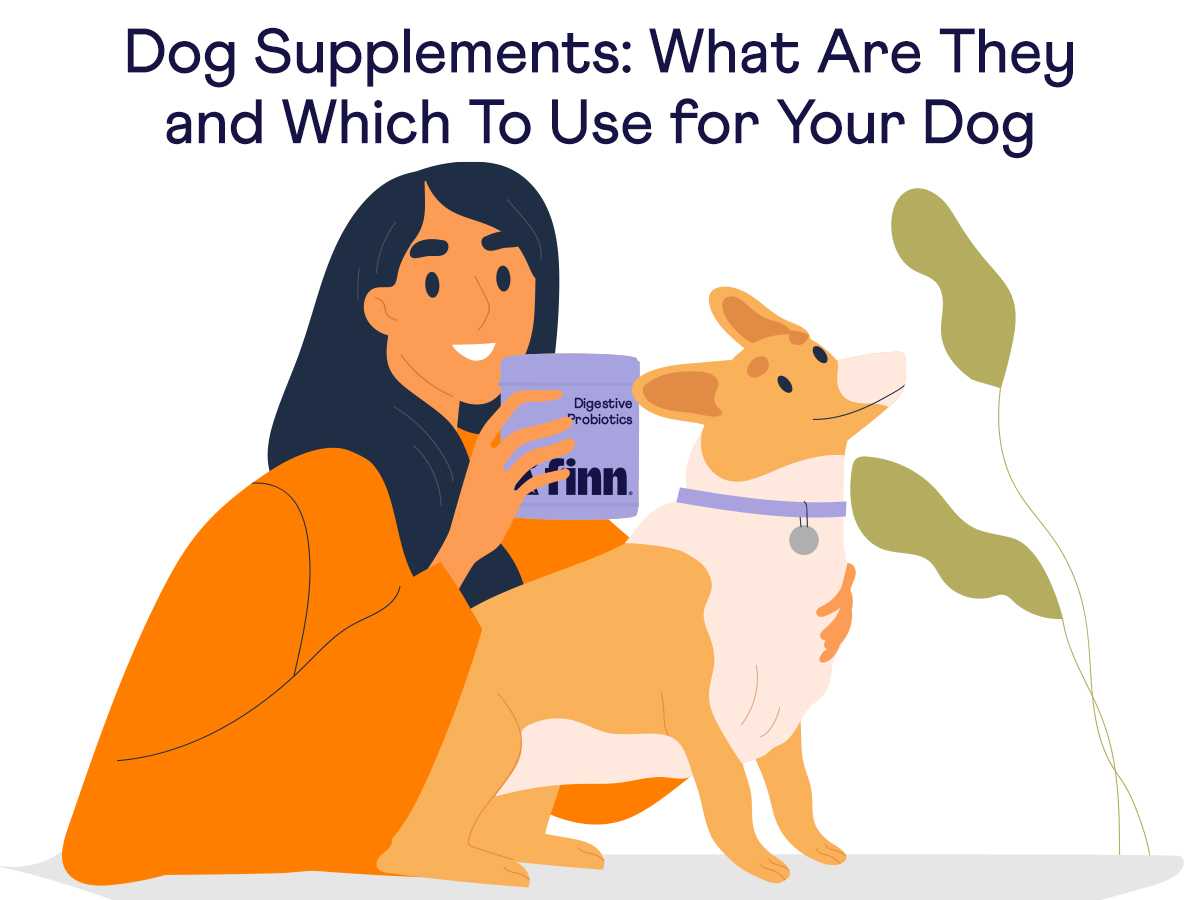
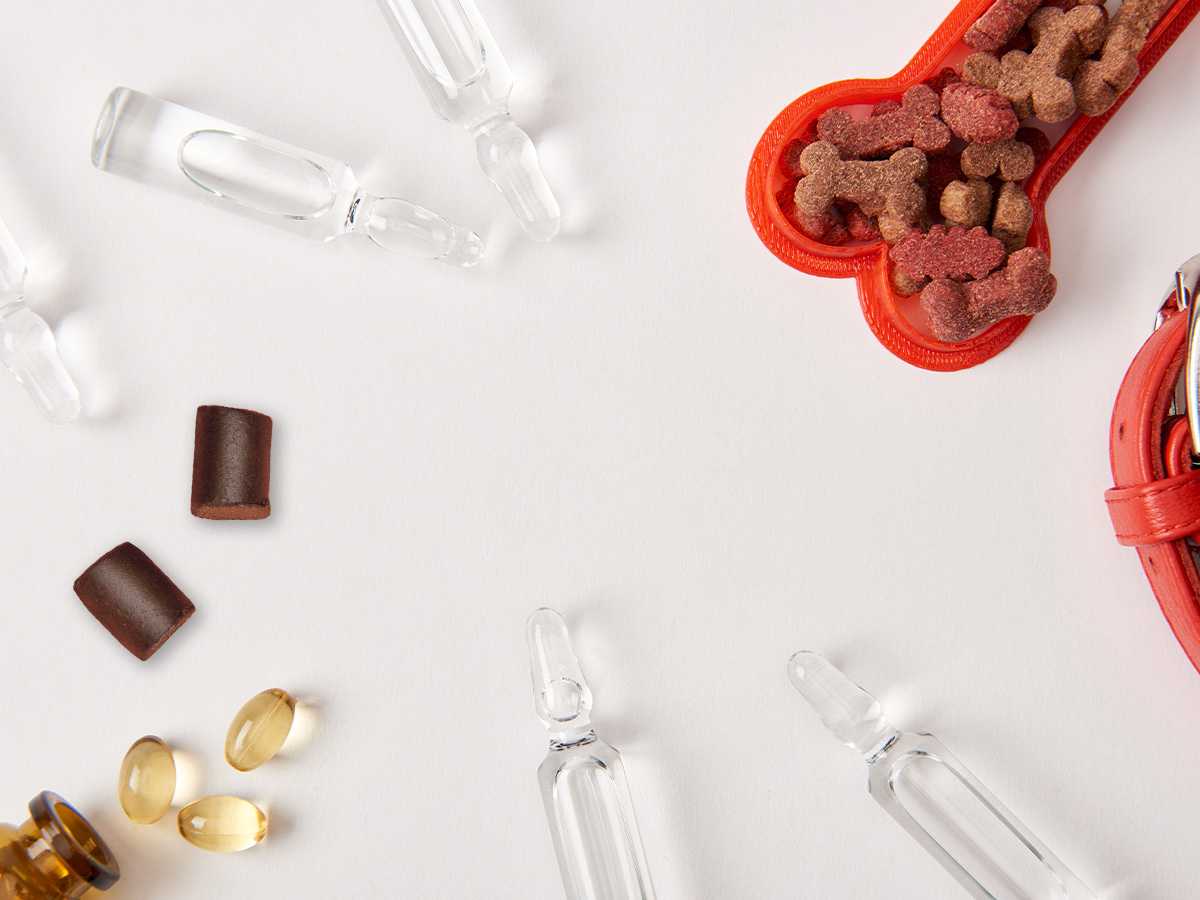


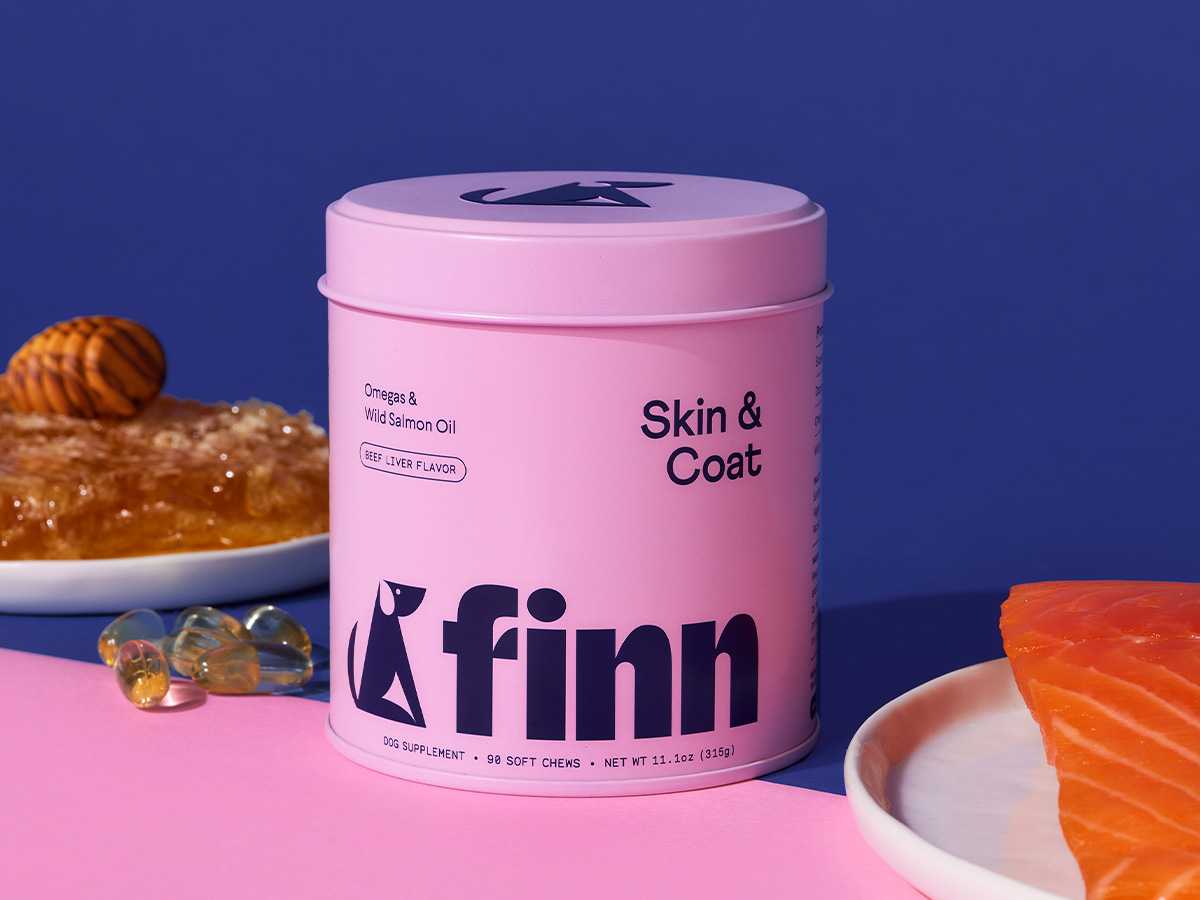
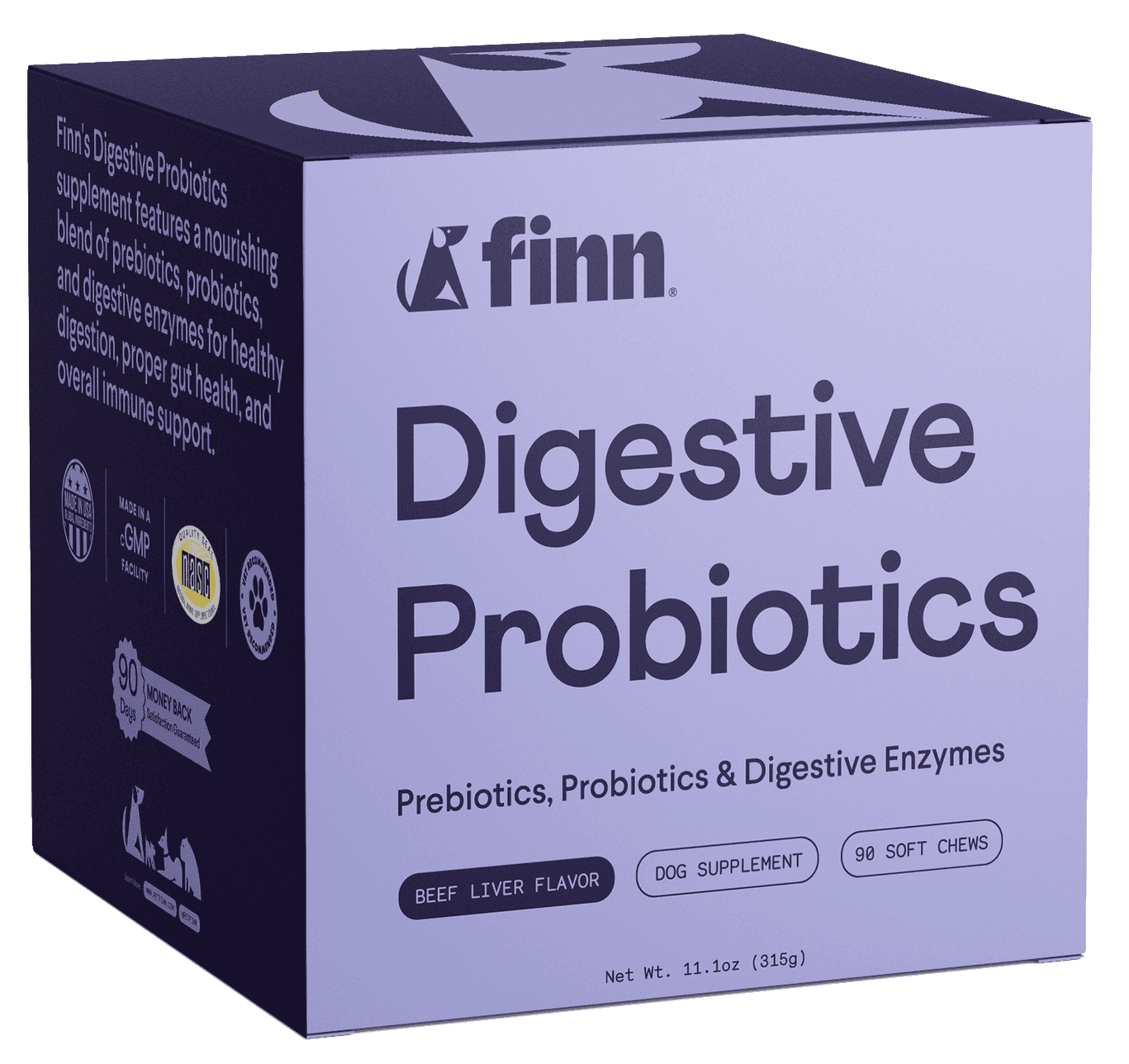
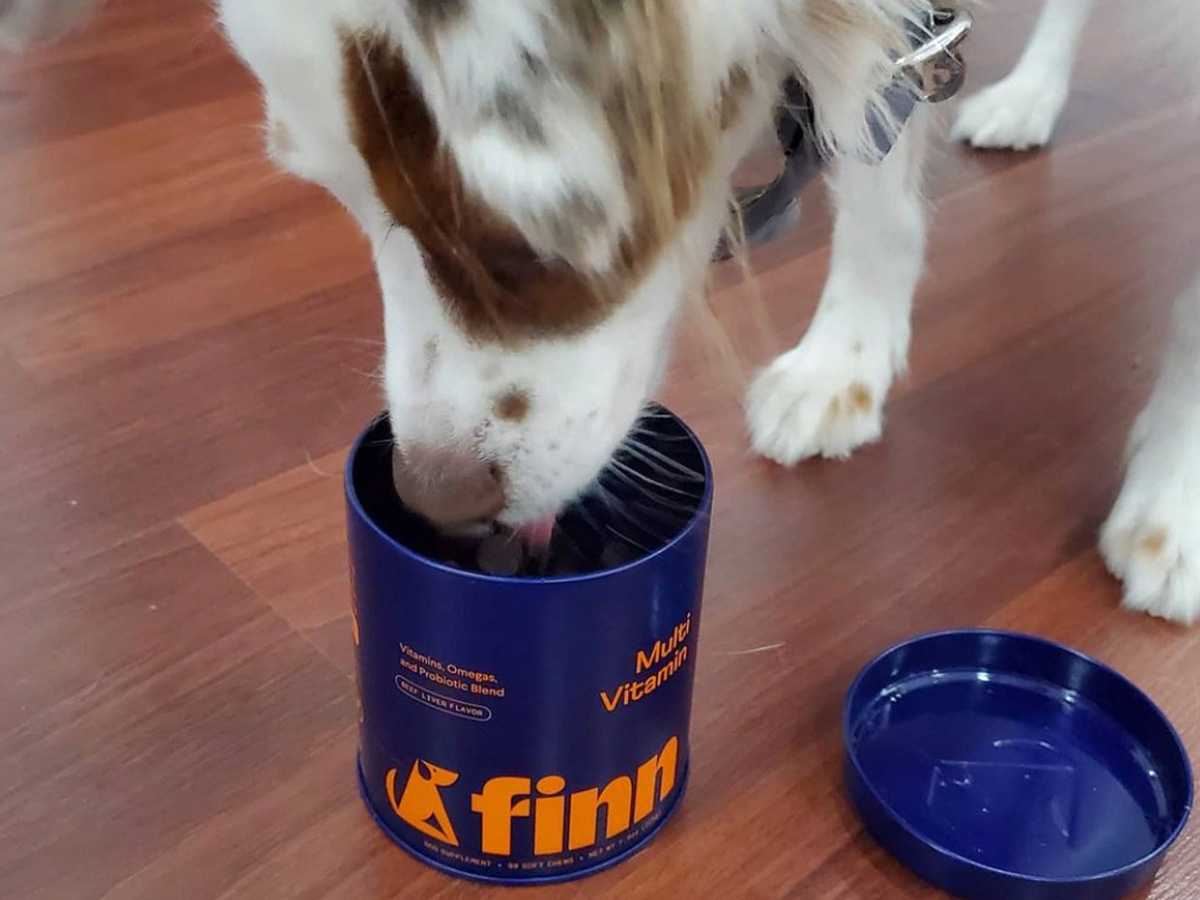
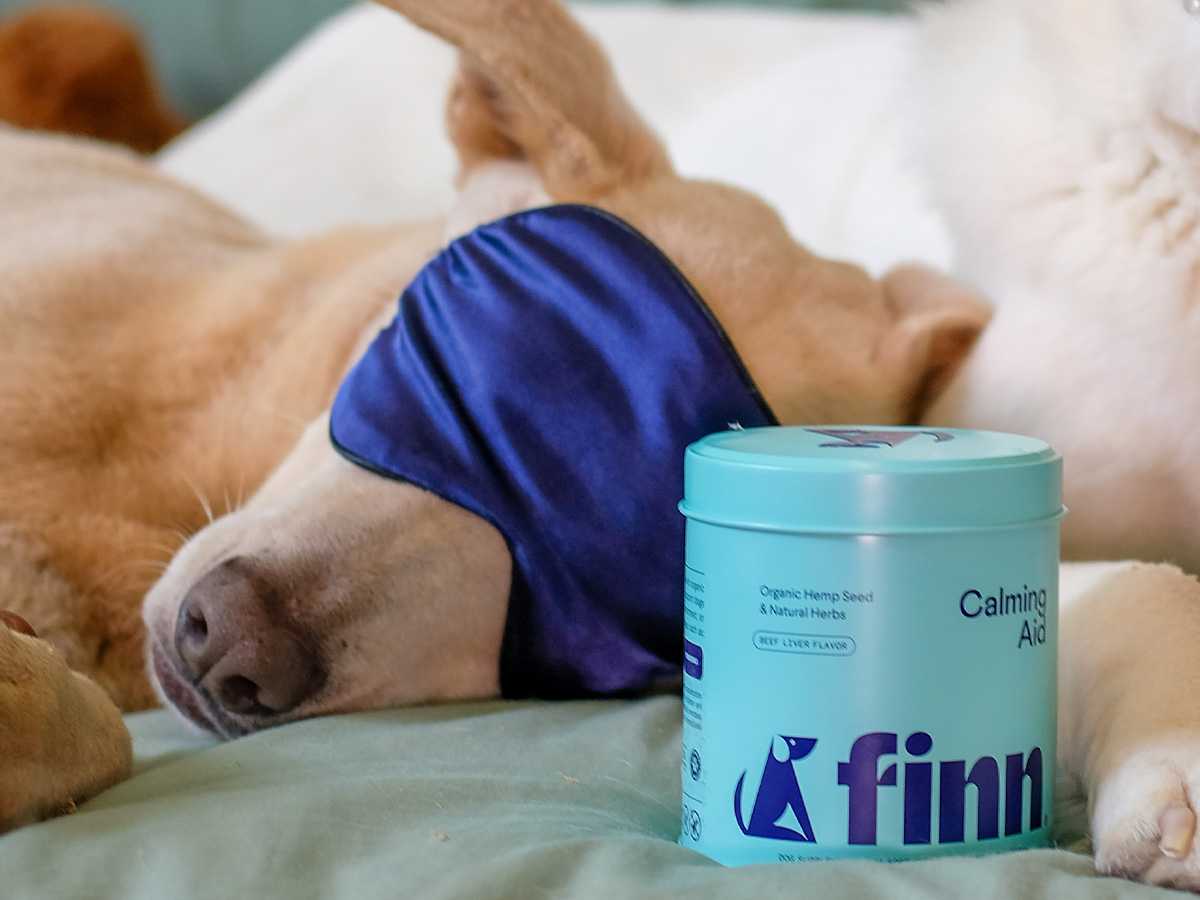




Comments: